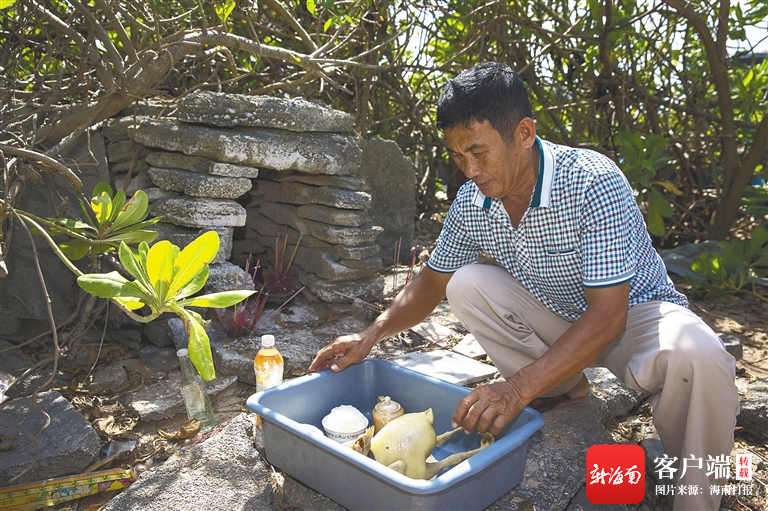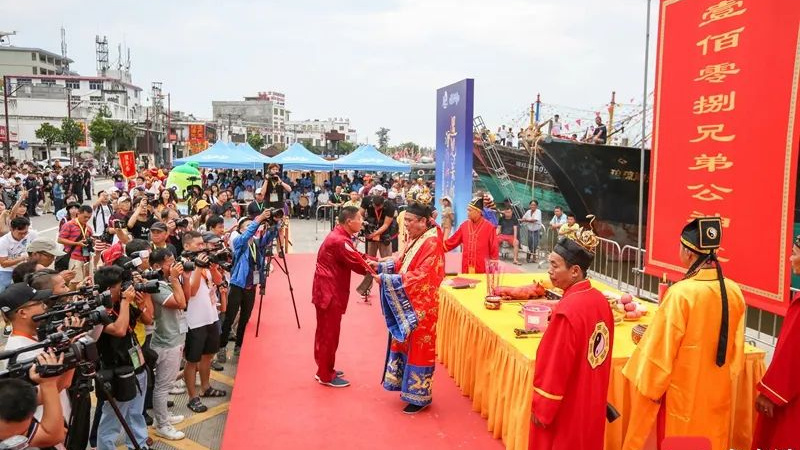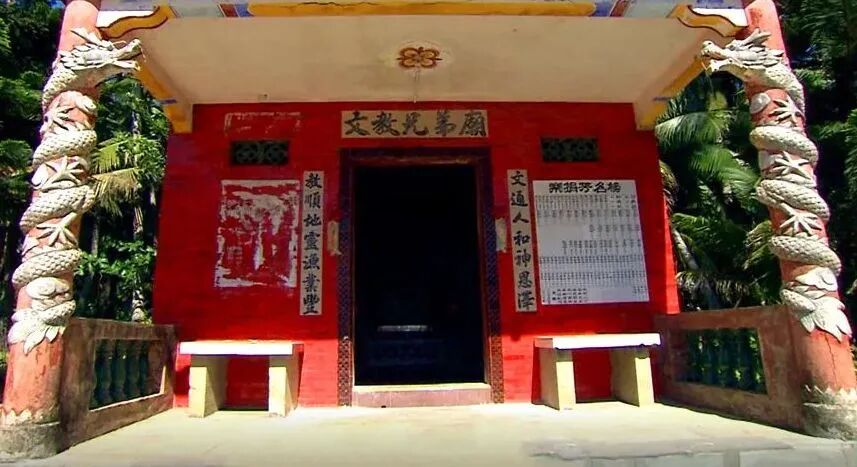The 600-year-old "Brothers Going to Sea Ritual" of Hainan Island
海南日报2025-09-21 16:56:15
On June 10, 2021, four of Hainan's local intangible cultural heritage items were listed as part of the fifth batch of items inscribed by the State Council on the national-level ICH List. These include the "Brothers Going to Sea Ritual", "Songs of the Tanka Boat People", the Miao ethnicity Panhuang Dance, and the bone tool making skills of the Li ethnic groups in Baisha Li Autonomous County.
A folk custom from the eastern Hainan city of Qionghai's Tanmen Town, the Brothers Going to Sea Ritual, or Xiongdi Gong, takes place annually on the 15th day of the seventh month of the traditional Chinese calendar. Returning home to offer sacrifices, local fishermen pray for peace and a good catch.
"Even during the Spring Festival, I don't necessarily make time to go home, but I absolutely must go home for the Brothers Festival."

Fishermen worship at the Brothers Temple on Sansha's Zhaoshu Island. (Photo by Song Guoqiang, Hainan Daily)
The Tanmen "Legend of 108"
The Brothers Going to Sea Ritual is inextricably linked to the local "Legend of 108".
People from Hainan's eastern seaboard have a long history of interaction with the ocean. Among the people of the South China Sea who have engaged in fisheries and aquaculture for as far back as written records exist, many of them come from places along the lower reaches of the Wanquan River such as towns of Tanmen and Boao in Qionghai.
Worship and veneration of the 108 Brothers is a unique reflection of Qionghai's maritime culture. In past centuries, when the pirates of the South China Sea were so bold as to attack anything that floated, legend has it that, a group of 108 sworn brothers from Tanmen Town banded together and formed an impressive fleet of fishing boats with the goal of mutual protection. On one trip, this flotilla of fishermen, tied their boats together and not only repelled but overcame the enemy. Ever since, the example set by the Legend of the 108 has led to fishermen setting sail together, and the Brothers have become a spiritual symbol of unity, cooperation, progress, and togetherness.
Another story in the Legend of the 108 takes place some years after their successful rout of the pirates when the fleet encountered bad weather and—with no man abandoning another—the brothers drowned as one. The story of these sworn brothers is unforgettable.

Prior to the middle years of the Ming Dynasty (1368 - 1644), fishermen from Tanmen would travel to the Xisha Islands and Nansha Islands every winter to fish. Returning to their families in the summer, they left some homes and temples on the southern islands. Enough women traveled with them to settle the islands with rough thatched huts and coral brick houses. Like their cousins from the big island, they went fishing, built temples, and worked hard one generation after another. When the winds blow fierce and survival depends on the ability to trust the other men aboard your boat or nearby boats, the knowledge that they too pay homage to the Brothers at one of the many temples to them scattered along the coast of Tanmen are a form of spiritual sustenance and succor for the fishermen going out to sea and the families they leave on shore.
A more than 600-year-old ceremony
Dating back to the Ming Dynasty, there are three main parts to the 600-year-old Brothers Going to Sea Ritual: a sacrifice prior to setting sail, one after returning from a long voyage, and one during major festivals or when a ship arrives in a new area of the ocean.
Although the processes of these three rituals are all similar in that they offer meat, rice and alcohol as tribute to the 108 Brothers, burn joss and set off firecrackers, the ceremony which takes place prior to setting sail is the most important. Held in Brother temples and on fishing boats, the captain prays to the "108 Brothers".
Now a unique part of Tanmen's maritime culture, the past few decades have seen the people of the region build or rebuild Brother temples in every village in order to commemorate these 108 sworn brothers who left behind not even so much as their names, and to recognize that "out on the ocean every man is a brother to every other man, and every man helps his brothers out".

In front of the Wenjiao Village Brothers Temple, a couplet expresses the desire for the Brothers to grant succor to any fisherman who is in danger. Offering wishes and blessings for a safe return, it also commemorates those who went out to sea and never came back.
南海网版权声明:以上内容由南海网原创生产,未经书面许可,任何单位及个人不得以任何方式或理由对上述内容的任何部分进行使用、复制、修改、抄录、传播或与其它产品捆绑使用、销售。如需转载,请与南海网联系授权,凡侵犯本公司版权等知识产权的,本公司必依法追究其法律责任。电子邮箱:nhwglzx@163.com.